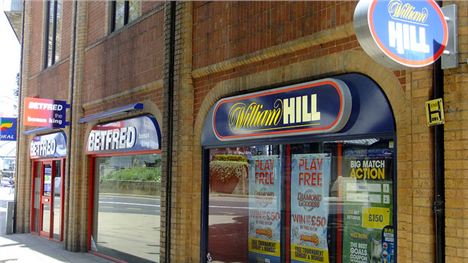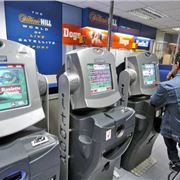FORGET Las Vegas, welcome to Las Liverpool, the gambling capital of Merseyside.
But don’t expect dazzling, neon-lit boulevards lined with casinos. Instead think desperate addicts who are able to flutter away £100 every TWENTY seconds on what has been dubbed the “crack cocaine of gambling”.
Liverpool people spend a cool £600m a year on gaming machines in betting shops across the city.
And on Wednesday two Labour councillors, Cabinet Member Nick Small and former Lord Mayor Sharon Sullivan, will lead an assault on the growth of FOBTs, or Fixed Odds Betting Terminals in hundreds of betting shops.
They want the high-stakes machines completely banned in city betting shops.
Unlike fruit machines in pubs, bingo halls and amusement arcades, where cash stakes are limited to £2, gamblers using FOBTs can use debit cards to bet up to £100 every 20 seconds, chasing a jackpot of £500 – more than four times as fast as the rate of play in casinos.
Riverside
The councillors say that nationally, 80 percent of turnover in betting shops is from FOBTs with only 20 percent being from over-the-counter betting on sports and racing.
Then comes the stark reality of this new form of gambling.
Across the five Liverpool Parliamentary constituencies there are 153 betting shops with 559 fixed-odd terminals. In 2012 a gross amount of £607m was gambled in these betting shop, broken down as follows:
* Liverpool Riverside – 52 betting shops - 189 FOBTs - £204m gross amount gambled.
* Liverpool Walton – 33 betting shops - 120 FOBTs - £129m gross amount gambled.
* Liverpool Wavertree – 31 betting shops - 115 FOBTs - £123m gross amount gambled.
* Liverpool West Derby – 20 betting shops - 73 FOBTs - £78m gross amount gambled.
* Garston & Halewood – 17 betting shops - 62 FOBTs - £67m gross amount gambled.
A recent economic analysis was commissioned by the Campaign for Fairer Gambling to assess the impact of the growth in FOBTs on spending on local economies.
The report concluded that an extra £1bn gambling on FOTBs produces a net reduction of 13,000 jobs. A projected doubling of FOBT revenue by 2023 could destroy as many as 23,000 jobs, it said.
 There are 153 betting shops in Liverpool
There are 153 betting shops in Liverpool
The report also highlighted the negative impact of the increase in new betting shops and relocation of betting shops to busy shopping areas is having on the wider retail economy.
Problems
Cllrs Small and Sullivan say they are concerned about the lack of action by the Government, criticising the decision Culture Secretary earlier this month for failing to take any action to reduce maximum stakes, speed of play and maximum jackpots. Such restrictions have been imposed across the Irish Sea where the Irish Government has introduced legislation to outlaw FOBTs in betting shops.
Liverpool Council will be asked to recognise the significant problems in Liverpool caused by FOBTs and call on the Government to introduce legislation to outlaw FOBTs in betting shops.
At the very least they want local authorities to be given powers to protect the local amenity and wellbeing of communities by stopping the proliferation of betting shops and reducing maximum stakes and slowing down the speed of play of FOBTs.
Taking matters into their own hands

In the absence of Government action, some innovative work has been done by various councils, concerned about the problem.
The London Borough of Barking and Dagenham wants to use planning rules to restrict betting shops in its communities.
In London, 14 councils want to use the Sustainable Communities Act to control the spread and activities of betting shops.
The London Borough of Lambeth is considering introducing local a local bye-law to reduce maximum stakes to £2 per spin and reduce speed of play.










